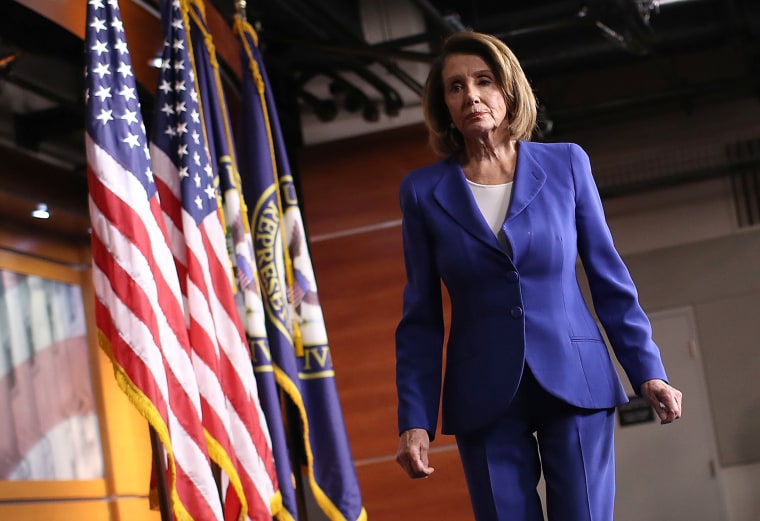During Nancy Pelosi's first stint as Speaker of the House, she had an ally on the other side of Capitol Hill. The California Democrat first took the gavel after the 2006 midterms and immediately got to work with a Senate led by Harry Reid (D-Nev.), and for four years, they were cooperative allies.
After the 2018 midterms, Pelosi has returned to the role, though her new congressional partner is Senate Majority Leader Mitch McConnell (R-Ky.) -- who doesn't quite see things the way Pelosi does.
With this in mind, this week's fight over a $4.6 billion border bill clearly did not go the way the Speaker hoped. The Senate version ended up passing the lower chamber yesterday, but as the roll call showed, Pelosi lost a significant chunk of her own conference en route to passage.
That said, it wasn't the only bill on the schedule yesterday. Roll Call reported:
The House passed an election security measure Thursday that would require voting systems to use backup paper ballots in federal contests, while also mandating improvements to the higher-tech side of the polls. [...]The measure, known as the Securing America's Federal Elections Act, passed Thursday would authorize $600 million for states to bolster election security. It also would give states $175 million biannually to help sustain election infrastructure.It would also require implementation of cybersecurity safeguards for hardware and software used in elections, bar the use of wireless communication devices in election systems and require electronic voting machines be manufactured in the United States.
The bill, generally known as the SAFE Act, passed 225 to 184. Only one Republican -- Florida's Brian Mast -- supported the bill, and Democrats were unanimous on the proposal.
It now heads to McConnell's Senate, where the bill will almost certainly die. And if that dynamic sounds familiar, it's because we've seen quite a bit of it recently.
The White House and its allies have been aggressive of late pushing a specific talking point: House Dems aren't doing any real work. Indeed, as regular readers know, Donald Trump has been almost hysterical on this point, recently tweeting, "[T]he Dems are getting nothing done in Congress. They are frozen stiff." It came on the heels of a series of related missives, one of which insisted, "Democrats … don't want to do anything."
Senate Homeland Security Committee Chairman Ron Johnson (R-Wis.) also recently argued, "It's going to be pretty hard to pass legislation when that's all the House is really doing [focusing on investigating White House scandals]. I warned voters ahead of the 2018 election that if you put Democrats in front of the House, all you're going to be talking about is investigations, talk of impeachment and it won't be about governing."
Recent events suggest neither Johnson nor the president have any idea what they're talking about. House Democrats have been legislating at a pretty remarkable pace.
Yesterday, obviously, saw passage of unrelated bills on the border and election security. The House also moved closer to passing a bill requiring carbon monoxide detectors in public housing.
We've also recently seen the House Democratic majority tackle the 9/11 Victims Compensation Fund, blocking Trump's ban on transgender troops, and passing spending measures to prevent a government shutdown.
These follow a series of related votes -- House Dems have already passed more than half of their top 10 priorities for this Congress -- on bills related to everything from Dreamers to lowering prescription drug costs to expanding the Violence Against Women Act.
After the 4th of July, party leaders have also scheduled work on a minimum-wage increase, a reparations study, and renewed efforts to block the administration's arms sales to Saudi Arabia.
Stepping back, the House Democratic majority doesn't exactly appear "frozen stiff." But just as importantly, the idea that Dems are so preoccupied with investigating Trump's scandals that they can't focus on legislative priorities is obviously tough to take seriously.
